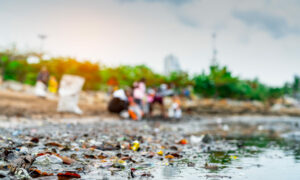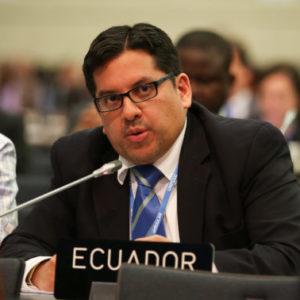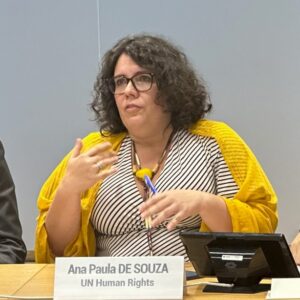Événement Virtuel
Launch and Panel Discussion | Plastics Treaty: Aligning States Duties and Business Responsibilities with the Guiding Principles on Business and Human Rights

12 Avr 2024
14:00–15:00
Lieu: Online | Webex
Organisation: Haut commissariat des Nations Unies aux droits de l'homme, Geneva Environment Network
This event, which took place ahead of the fourth session of the Intergovernmental Negotiating Committee to develop an international legally binding instrument on plastic pollution, was co-organized with the Office of the High Commissioner for Human Rights, within the framework of the Geneva Beat Plastic Pollution Dialogues. The event launched and discussed a note on "Aligning States Duties and Business Responsibilities with the Guiding Principles on Business and Human Rights".
About this Session
Plastic pollution is inextricably linked to adverse human rights impacts, and businesses involved in plastics have unique capacity and responsibilities to respect human rights throughout their value chains. A clean, healthy, and sustainable environment is a human right crucial for the full enjoyment of virtually all other human rights, including the right to development. The impact of the private sector on both human rights and the environment has also been well established. There is broad and growing consensus that current patterns of plastic production, use, and disposal are causing a global health, environmental and human rights crisis.
The paper to be launched and discussed in this event examines the relationship between plastics industry value chains and the environmental and human rights harms caused throughout the plastics life cycle, and includes a case study on plastic sachets to illustrate this relationship. Given the business sector’s central role throughout the plastics life cycle, and the inherent human rights impacts at stake, a human rights approach rooted in the United Nations Guiding Principles on Business and Human Rights (the UNGPs) is needed to address this crisis. The UNGPs recognize States’ duties to protect human rights from abuse by third parties, including the private sector. Businesses are expected to engage with stakeholders whose human rights they may impact through their activities or as a result of their business relationships, and take action to identify, prevent, mitigate, and, where appropriate, remedy their adverse impacts on human rights.
Leading experts joining this event discussed the opportunity provided by the Global Plastics Treaty to shape more legitimate, effective and coherent international cooperation on plastics pollution by aligning efforts with the UNGPs.
Geneva Beat Plastic Pollution Dialogues

The world is facing a plastic crisis, the status quo is not an option. Plastic pollution is a serious issue of global concern which requires an urgent and international response involving all relevant actors at different levels. Many initiatives, projects and governance responses and options have been developed to tackle this major environmental problem, but we are still unable to cope with the amount of plastic we generate. In addition, there is a lack of coordination which can better lead to a more effective and efficient response.
Various actors in Geneva are engaged in rethinking the way we manufacture, use, trade and manage plastics. The Geneva Beat Plastic Pollution Dialogues aim at outreaching and creating synergies among these actors, highlighting efforts made by intergovernmental organizations, governments, businesses, the scientific community, civil society and individuals in the hope of informing and creating synergies and coordinated actions. The dialogues highlight what the different stakeholders in Geneva and beyond have achieved at all levels, and present the latest research and governance options.
Following the landmark resolution adopted at UNEA-5 to end plastic pollution and building on the outcomes of the first two series, the third series of dialogues will encourage increased engagement of the Geneva community with future negotiations on the matter.
Speakers
By order of intervention.

Walter SCHULDT
Minister, Permanent Mission of the Republic of Ecuador to the United Nations Office and other international organizations in Geneva

Anita RAMASASTRY
Henry M. Jackson Professor of Law | Faculty Director, International, Transnational and Comparative Law Programs, Director, Sustainable International Development LLM Program, University of Washington School of Law

Marcos ORELLANA
UN Special Rapporteur on toxics and human rights

Mihir KANADE
Head, Department of International Law, University for Peace | Member, UN Expert Mechanism on the Right to Development

Charlene COLLISON
Director, Collaborations, BSR | Director, Fair Circularity Initiative (FCI) Secretariat

José Manuel MOLLER
Founder and Chairman, Algramo | Vice President of Advisory Board on Zero Waste | UNEP Champion of the Earth

Prem SINGH THARU
Programme Officer, Environment Programme, Asia Indigenous Peoples Pact

Tania ESPINOSA SÁNCHEZ
Latin America Coordinator, Law Program, WIEGO

Dharmesh SHAH
Consulting Senior Campaigner (Plastics Treaty), Environmental Health Program, Center for International Environmental Law

Emma PRIESTLAND
Corporate Campaigns Coordinator, Break Free From Plastic

Ana Paula DE SOUZA
Human Rights Officer, Office of the High Commissioner for Human Rights | Moderator
Highlights
Video
Live on Webex
Summary
Walter Schuldt opened the discussion by highlighting in his keynote address that despite the increasing recognition of the impacts of pollution on the environment, health, and human rights, there is lack a direct reference to human rights in UNEA Resolution 5/14, nor references to businesses. However, he identified some relevant “entry-points”, such as the negative impacts on the different dimensions of sustainable development, the need to improve understanding of global impacts, the need to strengthen coordination and avoid detriments from plastic pollution on human activities, and the reference to the contribution made by workers. The operative part of the Resolution also refers to the precautionary and polluter-pays principles, encourages multi-stakeholder action, and calls for measures related to sustainable consumption and production. He recalled that there is already damage made, and for which responsibility needs to be established. Incorporating and making use of the UNGPs will be key, in terms of how responsibility can be incorporated.
Ana Paula Souza, recalls that each stage of the life cycle of plastics from extraction to disposal, are adversely impacting human rights, especially the human rights to life, health, a healthy environment, food, water, sanitation, cultural rights, the right to development, and access to information. The UNGPs is a powerful and widely accepted set of standards to guide states and business efforts and can contribute to enhancing accountability and governance in the context of the new Plastics Treaty.
Anita Ramasastry emphasized that the human rights law and the UNGPs can contribute to enhancing accountability and governance in the context of the legally binding instrument on plastics. She recalls the three pillars of the UNGPs: the protect, respect, and remedy framework. The first pillar requires States to protect human rights from business activities in the context of plastic solutions, including ensuring coherent domestic and international legislation that meaningfully regulates plastic companies through their value chains and the life cycle of plastic. Under pillar two, plastic industry actors should work towards fulfilling their human rights obligations. Options to do so include engaging in ongoing human rights due diligence, identifying, preventing, and mitigating, and then accounting for and remedying how they address their impacts on human rights. That can be done through engaging with right holders, such as frontline communities, Indigenous Peoples, consumers, and workers, and through fully disclosing the chemical composition of products and the known and suspected adverse impacts. The third pillar requires States and companies to ensure access to remedies, which can take the form of reparations, but also non-repetition.
UN Special Rapporteur on toxics and human rights, Marcos A. Orellana, emphasized that a human rights-based approach must be key to an effective and legitimate instrument to solve the plastic crisis in a manner that is equitable and does not create other human rights harm. He emphasized accountability, as for decades, plastic producers have profited and, as a result, created an environmental crisis of global proportions. They have also pushed for false or misleading solutions, such as by pushing the idea that plastic is recyclable. The polluter-pays principle is important and must be operationalized by implementing a global tax on plastic producers, traders, and other businesses. A global tax would address the legacy of pollution, and the suffering of coastal communities, fisherfolks, and other people affected by plastics. An effective extended producer responsibility across boundaries and the disclosure of plastic release at every stage of the plastic cycle are also key. He calls for aligning the Plastics Treaty with UNGP and explicitly includes human rights language in the preamble and the principles.
Mihir Kanade affirmed that the right to development does present the ideal normative framework for aligning the duties of States and businesses in the proposed Plastics Treaty with the UNGPs. He detailed key elements of the right to development, relevant to the Treaty. For example, the right to development and sustainable development are mutually reinforcing, making the right to development the most appropriate right to directly link the imperative of realizing human rights with sustainable development. The right to development requires that development, including through the contribution of States and Plastic businesses, must be such that all other human rights can be realized. States also have obligations at the internal, extra-territorial, and collective levels, thus putting obligations for host, but also home States to businesses. The principles of special and differentiated treatment, common but differentiated responsibilities, and respective capabilities in light of national circumstances, equity, and just transition, must be considered. The right to development entails the right of all individuals and people to participate in, contribute to, and enjoy development. It is essential that all stakeholders, including consumers, are included both in the treaty process and its implementation. Businesses themselves have a legal obligation to respect human rights under International Law (including the Draft covenant on the right to development), which means due diligence and impact assessment duties.
Charlene Collison recalled that businesses already have a responsibility to embrace the transition to a circular economy throughout their supply chains to ensure that the human rights of workers are recognized. To be effective, the plastics treaty needs very clear operational provisions to address human rights impacts that are experienced by workers throughout the supply chain, particularly waste-pickers. Companies are already working to advance the treaty. As examples of what companies can and should do, she detailed fair circularity principles, developed by the Fair Circularity Initiative, such as recognizing the critical role of informal waste sector workers in the recycling value chains, ensuring that companies engage all partners in plastic packaging recycling value chains, advocating for the inclusion of informal waste sector workers as relevant stakeholders in policy-making processes that might affect their livelihoods, or promoting greater integration of the informal waste sector into formal value chains.
José Manuel Moller addressed the issues of sachets and small formats, which create a “poverty tax”. “The poverty tax” happens when families who do not have enough resources are forced to get a small portion of a product (i.e., a portion of cooking oil, dish soap, etc.). They pay 40-50% more than they would for the larger packaging, and this is due to the cost of the packaging. He emphasized some of the challenges to moving away from this problem. Notably, he pointed to the focus being made on recycling, and, in the context of the Plastics Treaty, the focus on downstream rather than upstream solutions. Only less than 10% of the plastic is collected and only a fraction of that gets recycled on the same type of product. A lot of businesses have investments already made into facilities and factories to produce signe-use packaging. He called for a need to shift away from this model to have upstream solutions, such as stopping production and working with waste pickers as “reuse” partners who collect packages, wash them and reuse them.
Prem Singh Tharu discussed the lack of respect for the rights of Indigenous People by businesses due to the lack of strong policies, institutions, and plans of action. He pointed to the lack of political willingness to implement the UNGPs. There is no respect to the due diligence principle. The rights of people do not matter, nor does the destruction of the environment, and the extraction of resources. The State is influenced by economic benefits. It is important to integrate UNGPs in the Plastics Treaty: states and businesses should be responsible, and rights-holders impacted by plastic and other hazardous products should be respected and have access to remedies. As an example the cargo ship crash of 26 March, which contained hazardous materials. Because of the lack of responsibilities and respect for their duties, Indigenous Peoples rights to health, land, territories, and resources are being impacted, and they are being criminalized and colonized.
Tania Espinosa Sánchez affirmed that Extended Producer Responsibility (EPR) is a growing part of the corporate agenda with companies increasingly mandated to comply with or develop themselves EPR policies. She highlighted that most of the time, EPR systems exclude or further marginalize waste-pickers by creating new competition, enforcing costly permitting or infrastructure requirements, or expanding collection. To protect the right to work and the right to life of workers, it is essential that the plastic treaty, when speaking of EPR, guarantees just transition with special consideration for waste-pickers. It is essential that waste pickers are integrated into the articles of the treaty, and are defined, to best integrate waste pickers in EPR systems. We should also minimize economic disruption to waste-pickers and provide for the recognition of waste-pickers and their work, include them in the design and implementation of the system, ensure opportunities for waste-pickers to advance in the value chain and into more organized and formal work and protect public access to recycle levels of reusables as well as commercialization points.
Dharmesh Shah calls for businesses’ human rights due diligence as a key element of the Treaty. He talked about key areas of corporate and human rights due diligence under the UNGPs. One of the main concerns that rights holders have in this context is the lack of information on the potential harms of plastics and associated chemicals, participation in environmental governance and policymaking, and access to justice. While the current draft is inadequate, the future instrument should hold businesses accountable for their impacts on human rights by integrating and operationalizing procedural rights across the treaty text and ensuring a greater role for rights holders in environmental governance.
Emma Priestland addressed the barriers for companies to stop single-use plastics, and how to reflect that in the treaty. She discusses the overwhelming quantity of plastics sold, the expected increase (expected to reach 3 trillion sachets sold by 2027), and the origin of plastic waste. She pointed out that while sachets producers are making voluntary commitments to tackle plastic pollution, they’re currently showing no signs of reducing their reliance on sachets. Saches end up in landfills and rivers and beaches, harming ecosystems and ultimately damaging human health and livelihoods. She detailed available solutions, notably “use and refill”, which seems to be a viable business model that increases store owner profit and allows 20% savings for the consumer.
Documents
- Aligning States Duties and Business Responsibilities Related to Plastics with the Guiding Principles on Business and Human Rights | Information Note to the fourth session of the Intergovernmental Negotiating Committee to develop an international legally binding instrument on plastic pollution, including in the marine environment (INC-4) | OHCHR | 11 April 2024
- Comments concerning human rights principles and standards with a view to strengthen the current draft treaty ahead of INC-4 | SR toxics and human rights & SR right to healthy environment | 12 April 2024
Links

